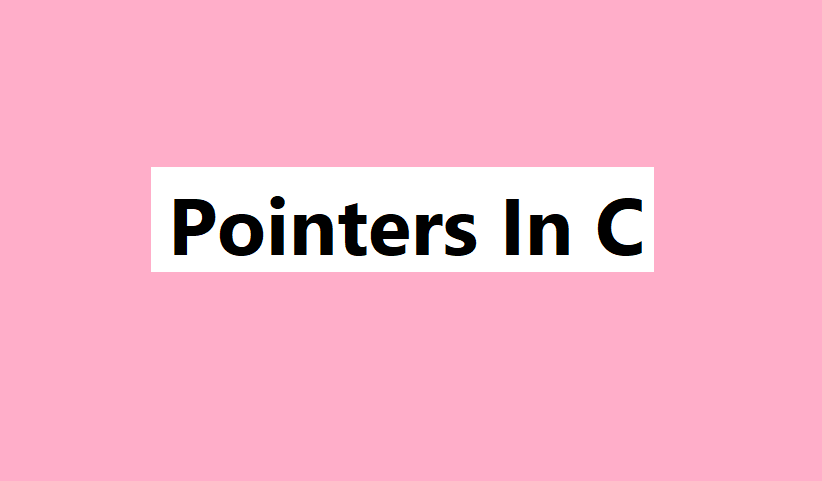In C, a pointer is a special variable that stores the memory address of another variable. Pointers provide a powerful way to manipulate data and memory in C by allowing direct access and manipulation of memory locations. Understanding pointers is crucial for tasks such as dynamic memory allocation, passing functions as arguments, and implementing data structures. Here’s an in-depth explanation of pointers with an example:
#include <stdio.h>
int main() {
int num = 10; // Declare an integer variable
int *ptr; // Declare a pointer variable
ptr = # // Assign the address of 'num' to the pointer variable
printf("Value of num: %d\n", num); // Print the value of 'num'
printf("Address of num: %p\n", &num); // Print the address of 'num'
printf("Value of ptr: %p\n", ptr); // Print the value stored in the pointer variable
// Dereferencing the pointer to access the value at the memory address it points to
printf("Value pointed to by ptr: %d\n", *ptr);
// Modifying the value using the pointer
*ptr = 20; // Change the value of 'num' through the pointer
printf("New value of num: %d\n", num); // Print the updated value of 'num'
return 0;
}
Explanation of the code:
int num = 10;: Declares an integer variable namednumand initializes it with the value 10.int *ptr;: Declares a pointer variable namedptrthat can store the memory address of an integer variable.ptr = #: Assigns the address of the variablenumto the pointer variableptr.printf("Value of num: %d\n", num);: Prints the value of the variablenum.printf("Address of num: %p\n", &num);: Prints the memory address of the variablenum.printf("Value of ptr: %p\n", ptr);: Prints the value stored in the pointer variableptr, which is the memory address ofnum.printf("Value pointed to by ptr: %d\n", *ptr);: Dereferences the pointerptrto access the value stored at the memory address it points to and prints the value.*ptr = 20;: Modifies the value ofnumthrough the pointerptr.printf("New value of num: %d\n", num);: Prints the updated value of the variablenumafter it has been modified through the pointer.
In this example, ptr is used to point to the memory location of the variable num. By dereferencing the pointer using the * operator, you can access and modify the value stored at that memory location. This simple demonstration illustrates the basic usage of pointers in C and their ability to manipulate data indirectly through memory addresses.
Certainly! Continuing with the explanation of pointers in C, let’s delve deeper into some advanced concepts and operations involving pointers:
- Pointer Arithmetic:
Pointers in C support arithmetic operations such as addition and subtraction. When an integer is added to or subtracted from a pointer, the pointer value is adjusted accordingly based on the size of the data type it points to. For example:
int *ptr; ptr = ptr + 1; // Moves the pointer to the next integer location
- Pointer to Pointer (Double Pointer):
In C, it is possible to have pointers that point to other pointers. This concept is known as a double pointer or pointer to a pointer. Double pointers are commonly used in scenarios where there is a need to modify the value of a pointer itself within a function.
int **doublePtr; int *ptr; doublePtr = &ptr; // Stores the address of ptr in doublePtr
- Pointers and Arrays:
In C, arrays are closely related to pointers. When an array is declared, the array name represents the address of the first element. This property allows you to use pointers to iterate through arrays and access individual elements.
int arr[5] = {1, 2, 3, 4, 5};
int *ptr = arr; // Points to the first element of the array
- Pointer and Dynamic Memory Allocation:
Pointers are crucial for managing dynamic memory in C. Functions likemalloc,calloc, andreallocreturn a pointer to the allocated memory. It is essential to deallocate this memory usingfreeto avoid memory leaks.
int *dynamicArray = (int *)malloc(5 * sizeof(int)); // Allocates memory for 5 integers
// Check if memory allocation is successful
if (dynamicArray != NULL) {
// Access and modify elements in dynamicArray
dynamicArray[0] = 10;
// ...
free(dynamicArray); // Deallocates the dynamically allocated memory
}
- Pointer and Function:
Pointers can be used to pass functions as arguments to other functions. This technique, known as function pointers, allows for the dynamic selection of functions at runtime.
void sayHello() {
printf("Hello!\n");
}
void executeFunction(void (*functionPtr)()) {
functionPtr(); // Calls the function whose pointer is passed as an argument
}
int main() {
executeFunction(sayHello); // Passes the address of the sayHello function
return 0;
}
Understanding these advanced concepts and operations involving pointers is crucial for effectively utilizing pointers in C programming. Pointers provide a powerful mechanism for managing memory, arrays, and functions, making them an integral part of C programming, particularly when dealing with memory-intensive tasks and low-level programming.
Happy Learning..

Leave a Reply